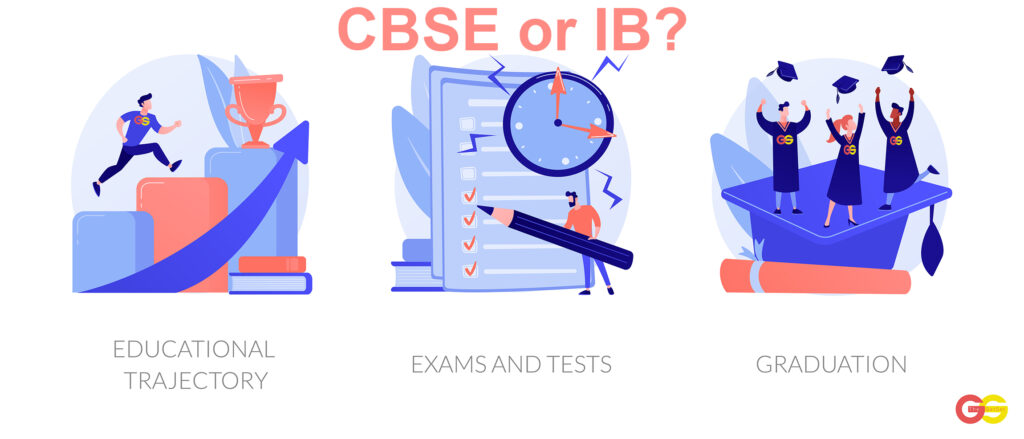As a parent, you would like to take every decision that can impact your child’s future and ensure that you provide them with the best solution. For a child, the school they attend and the curriculum they are exposed to makes a lot of difference. Children spend hundreds of hours in school in the course of their primary and secondary education. Subsequently, the choice of school plays a vital role in a child’s well-rounded development.
In this blog, we are going to highlight the features of two popular types of schooling boards namely, CBSE and IB. The section below discusses the benefits and downsides of each board for your review. Let’s GetSet and make only the well-informed decision.
What is the International Baccalaureate board?
The International Baccalaureate (IB) program is an international foundation for education that has its headquarters in Geneva, Switzerland. It aims at providing internationally standardised education to students worldwide. This model is designed to incorporate a wide variety of subjects and activities that enables students to become inquisitive, knowledgeable and empathetic future global citizens.
Along with the traditional subjects of math, science, social studies and languages, IB schools also emphasize in their curriculum, the importance of creative and vocational subjects like music, computer science, business administration and many others. This set-up inspires flexibility in the choice of subjects wherein students can make a choice. This kind of flexibility allows students the freedom to try and find the right mix of courses that allows them to happily productive.
Features of IB
- Balanced Educational Experience
- IB schools are renowned for the balanced approach they take in educating their students. The major subjects are divided into different groups like Languages, Humanities and Social Studies, Mathematics, Sciences and Creative studies. Students are required to take a subset of the courses available to them from a wide variety of courses in each group. This enables the student to choose subjects of their liking while still being exposed to and learning about each of the major domains.
- Knowledge oriented approach to Education
- IB schools do not focus on learning by rote or following a set of predefined text books but rather learning and understanding the concepts being taught in classes. The students are provided free access to whatever resources they may require and the courses and examinations are designed to maximize understanding of the course materials.
- Internationally Recognized Standard
- IB schools are internationally recognized and valid as precursors to a large number of foreign and domestic universities.
- Gateway programs to some of the best Universities in the world
- the students from IB schools can enrol for courses in the course of their final years that allow them to earn college credits while finishing school. This allows them to skip taking basic courses in university.
Disadvantages of IB
- Not designed for pursuing higher studies in Indian universities
- While accepted at many top universities internationally, making it an ideal choice for parents who want their children to attend university abroad, the course load and study methodology does not adequately train children for the type of education provided in Indian Universities.
- Expensive
- IB schools provide a lot of additional resources to the children but these added benefits come at a steep price. The average IB school fee for students is many magnitudes higher than that of indigenous boards.
What is the Central Board of Secondary Education?
The Central Board of Secondary Education (CBSE) was formed in 1962 with the aim of providing students in the country with a high level of quality education designed for securing a good higher education for students within Indian universities. CBSE board syllabus is the one that is followed by a large number of entrance exams for the most prestigious engineering and medical institutes in India.
Features of CBSE
Disadvantages of CBSE
Conclusion
IB and CBSE courses are designed to cater to different needs and requirements, it is up to the students and their parents to decide what type of schooling suits their needs.
If you have a plan to send your children abroad for university, want them to have a global education, and expenses are not an issue then IB schools provide an excellent choice. However, if you travel in the country a lot due to your profession and/or want your kids to study in the top universities in India itself then CBSE schools will never fail you.
Either of the ways every parent must inculcate the idea of knowledge-based education in children. Much more than grading, it should be about exploring and letting the child portray their best potential in the field of their choice.


Good analysis